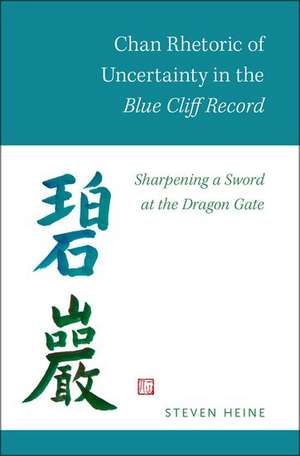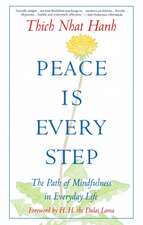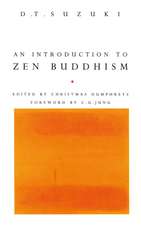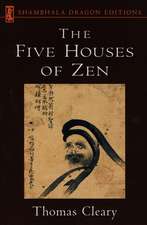Chan Rhetoric of Uncertainty in the Blue Cliff Record: Sharpening a Sword at the Dragon Gate
Autor Steven Heineen Limba Engleză Paperback – 16 iun 2016
| Toate formatele și edițiile | Preț | Express |
|---|---|---|
| Paperback (1) | 324.87 lei 31-37 zile | |
| Oxford University Press – 16 iun 2016 | 324.87 lei 31-37 zile | |
| Hardback (1) | 760.41 lei 31-37 zile | |
| Oxford University Press – 16 iun 2016 | 760.41 lei 31-37 zile |
Preț: 324.87 lei
Preț vechi: 370.73 lei
-12% Nou
Puncte Express: 487
Preț estimativ în valută:
62.17€ • 64.67$ • 51.33£
62.17€ • 64.67$ • 51.33£
Carte tipărită la comandă
Livrare economică 03-09 aprilie
Preluare comenzi: 021 569.72.76
Specificații
ISBN-13: 9780199397778
ISBN-10: 0199397775
Pagini: 360
Dimensiuni: 155 x 234 x 18 mm
Greutate: 0.5 kg
Editura: Oxford University Press
Colecția OUP USA
Locul publicării:New York, United States
ISBN-10: 0199397775
Pagini: 360
Dimensiuni: 155 x 234 x 18 mm
Greutate: 0.5 kg
Editura: Oxford University Press
Colecția OUP USA
Locul publicării:New York, United States
Recenzii
The topic of this thought-provoking publication is of major interest for everyone interested in the history of Chan/Zen Buddhism and East Asian religion in general. It is a fresh and innovative interpretation of a seminal collection of commentaries on one hundred gong'an /kōan pieces from the Song dynasty (960 1279), commonly referred to as "Blue Cliff Record"...[This] will remain a major academic contribution on the Bìyánlù.
In conclusion, this is an important and innovative literary, philosophical, and historical study of the Blue Cliff Record, and thus--given the work's importance--by extension of Chan/Zen writing, thought, and practice in China, Japan, and--to a lesser extent--Korea over the last thousand years. Throughout the book, Heine's truly impressive erudition on the topic is evinced above all by the sheer mastery with which he handles primary and secondary sources composed in diverse languages, cultures, and epochs... [H]is espousal of uncertainty as a soteriologically oriented rhetorical strategy in Chan works such as the Record will inform scholarly debate on the topic for many years to come.
There is much to like about Heine's book. His account of the textual evolution of the Blue Cliff Record and its vicissitudes in the days after its completion is meticulous, detailed, and richly supported by his use of data painstakingly combed from various texts. The book has also much to recommend itself in its account of the relation between the literary style of the Blue Cliff Record and the prevailing intellectual and cultural milieu of Chinese society in the Northern and Southern Song era... [A] wonderful new addition to the growing literature on Chan.
The work of author Steve Heine is a study focusing on, but not limited to, the Blue Cliff Record. By placing the Blue Cliff Record into an extended historical framework, Heine provides perspicacious analysis on the commentary tradition of Chan Buddhism... Heine offers a more holistic study on the Blue Cliff Record in comparison with other academic works focusing on the same topic. The great value of Heine's work is its unique vision, and the angle of seeing and addressing problems... All in all, Heine's innovative interpretations of the Blue Cliff Record will benefit scholars studying the fields of religion, literature, philosophy, and history.
The commentary by Heine (Heine, 2016) has extensive discussion on difficult points, including irony and literary style in general, gives Chinese text with the translation fragments and uses the Chinese pinyin standard for transliteration. It is invaluable in decoding the meaning of some of the kōans and commentary of the Blue Cliff Record although it does only cover a relatively small part the whole text.
Drawing from his impressive expertise and mastery of Chan literature, Steven Heine has written a tour de force. In this first extensive scholarly treatment of the Blue Cliff Record koan collection, Heine explores how the text, with its open-ended rhetoric of uncertainty, functions to extricate its readers from all assumptions and promote the existential doubt that precedes religious awakening. Scholars and Chan/Zen practitioners alike will relish this innovative and groundbreaking achievement.
In conclusion, this is an important and innovative literary, philosophical, and historical study of the Blue Cliff Record, and thus--given the work's importance--by extension of Chan/Zen writing, thought, and practice in China, Japan, and--to a lesser extent--Korea over the last thousand years. Throughout the book, Heine's truly impressive erudition on the topic is evinced above all by the sheer mastery with which he handles primary and secondary sources composed in diverse languages, cultures, and epochs... [H]is espousal of uncertainty as a soteriologically oriented rhetorical strategy in Chan works such as the Record will inform scholarly debate on the topic for many years to come.
There is much to like about Heine's book. His account of the textual evolution of the Blue Cliff Record and its vicissitudes in the days after its completion is meticulous, detailed, and richly supported by his use of data painstakingly combed from various texts. The book has also much to recommend itself in its account of the relation between the literary style of the Blue Cliff Record and the prevailing intellectual and cultural milieu of Chinese society in the Northern and Southern Song era... [A] wonderful new addition to the growing literature on Chan.
The work of author Steve Heine is a study focusing on, but not limited to, the Blue Cliff Record. By placing the Blue Cliff Record into an extended historical framework, Heine provides perspicacious analysis on the commentary tradition of Chan Buddhism... Heine offers a more holistic study on the Blue Cliff Record in comparison with other academic works focusing on the same topic. The great value of Heine's work is its unique vision, and the angle of seeing and addressing problems... All in all, Heine's innovative interpretations of the Blue Cliff Record will benefit scholars studying the fields of religion, literature, philosophy, and history.
The commentary by Heine (Heine, 2016) has extensive discussion on difficult points, including irony and literary style in general, gives Chinese text with the translation fragments and uses the Chinese pinyin standard for transliteration. It is invaluable in decoding the meaning of some of the kōans and commentary of the Blue Cliff Record although it does only cover a relatively small part the whole text.
Drawing from his impressive expertise and mastery of Chan literature, Steven Heine has written a tour de force. In this first extensive scholarly treatment of the Blue Cliff Record koan collection, Heine explores how the text, with its open-ended rhetoric of uncertainty, functions to extricate its readers from all assumptions and promote the existential doubt that precedes religious awakening. Scholars and Chan/Zen practitioners alike will relish this innovative and groundbreaking achievement.
Notă biografică
Steven Heine is Professor of History and Religion and Director of the Institute for Asian Studies at Florida International University.






![The Way of Zen =: [Zendao]](https://i0.books-express.ro/bt/9780375705106/the-way-of-zen.jpg)










